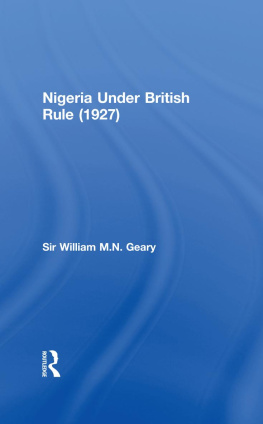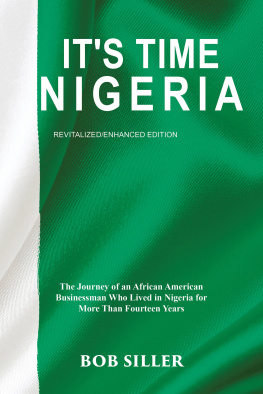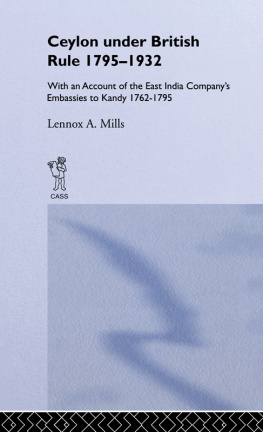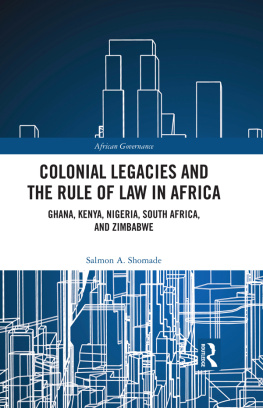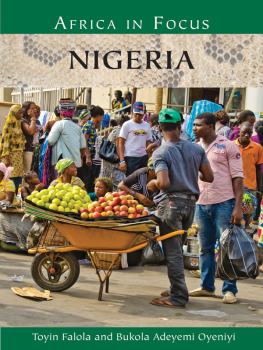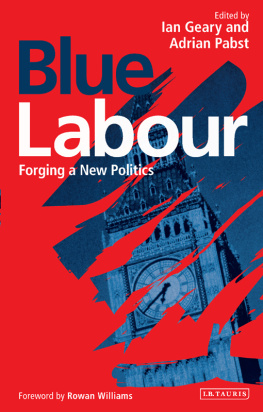Sir William M.N. Geary - Nigeria Under British Rule (1927)
Here you can read online Sir William M.N. Geary - Nigeria Under British Rule (1927) full text of the book (entire story) in english for free. Download pdf and epub, get meaning, cover and reviews about this ebook. year: 2013, publisher: Routledge, genre: Politics. Description of the work, (preface) as well as reviews are available. Best literature library LitArk.com created for fans of good reading and offers a wide selection of genres:
Romance novel
Science fiction
Adventure
Detective
Science
History
Home and family
Prose
Art
Politics
Computer
Non-fiction
Religion
Business
Children
Humor
Choose a favorite category and find really read worthwhile books. Enjoy immersion in the world of imagination, feel the emotions of the characters or learn something new for yourself, make an fascinating discovery.
- Book:Nigeria Under British Rule (1927)
- Author:
- Publisher:Routledge
- Genre:
- Year:2013
- Rating:4 / 5
- Favourites:Add to favourites
- Your mark:
- 80
- 1
- 2
- 3
- 4
- 5
Nigeria Under British Rule (1927): summary, description and annotation
We offer to read an annotation, description, summary or preface (depends on what the author of the book "Nigeria Under British Rule (1927)" wrote himself). If you haven't found the necessary information about the book — write in the comments, we will try to find it.
Nigeria Under British Rule (1927) — read online for free the complete book (whole text) full work
Below is the text of the book, divided by pages. System saving the place of the last page read, allows you to conveniently read the book "Nigeria Under British Rule (1927)" online for free, without having to search again every time where you left off. Put a bookmark, and you can go to the page where you finished reading at any time.
Font size:
Interval:
Bookmark:


2 Park Square, Milton Park, Abingdon, Oxon OX14 4RN
711 Third Avenue, New York, NY, 10017, USA
TO THE MEMORY OF THE LATE
RIGHT HONOURABLE JOSEPH CHAMBERLAIN
SECRETARY OF STATE FOR THE COLONIES
FROM 1895 TO 1903
WHOSE STATESMANSHIP DEVELOPED
WEST AFRICA
FOR THE BENEFIT OF ITS
NATIVE INHABITANTS, FOR BRITISH TRADE
AND FOR THE INCREASE OF THE EMPIRE
_________________ |
(By Permission of the Bank of British West Africa Ltd.) |
(a) | Suppression of the slave-trade. |
(b) | Encouragement of lawful commerce. |
(c) | Abolition of human sacrifice in their neighbourhood. |
(d) | The establishment of our own legal tribunals in all the territories under our rule had given facilities for relief to those who are oppressed, of which they are very ready to avail themselves, and therefore mitigated domestic slavery. |
(a) | Their unhealthiness, and |
(b) | The cost; an imperial subvention of 12,000 a year being required in aid of the civil government of the Colonies, as well as keeping up the military-naval force at a cost of 140,000. |
Font size:
Interval:
Bookmark:
Similar books «Nigeria Under British Rule (1927)»
Look at similar books to Nigeria Under British Rule (1927). We have selected literature similar in name and meaning in the hope of providing readers with more options to find new, interesting, not yet read works.
Discussion, reviews of the book Nigeria Under British Rule (1927) and just readers' own opinions. Leave your comments, write what you think about the work, its meaning or the main characters. Specify what exactly you liked and what you didn't like, and why you think so.

